




2 The Bradford (Pa.) Era Tuesday, August 22, 2023 campus life | august 2023
The UniversiTy of PiTTsbUrgh aT bradford oPened iTs firsT academic bUilding in more Than 20 years dUring The 202223 academic year. The new bUilding made Possible Two new engineering Technology majors and will serve as a hUb for innovaTion in The region.


 (PhoTo by glenn melvin)
(PhoTo by glenn melvin)
Open hOuses set fOr fall


The University of Pittsburgh at Bradford will hold four Saturday open houses this fall that will offer the best opportunity for students and their families to meet faculty and staff, tour campus and talk with current students all in one afternoon.
The open houses begin at noon and will be held on four Saturdays: Oct. 14, Oct. 21, Nov. 4 and Nov. 11.

Open Houses include a chance to meet faculty and student-support staff. Students and families will experience presentations about the admission process and tour the campus, including first-year residence halls with a student ambassador. Students and families can also attend separate sessions with a student panel and members of the faculty.
“Open houses are a great opportunity to talk with members of the Pitt-Bradford community,” said admissions counselor Katherine Moyer, adding that, if families cannot make it to an open house, tours are available daily.
For those still unable to visit in person, a virtual tour is available online at upb. pitt.edu/visit-campus, where students and their families can also register to attend in-person events. For more information and details about events, please check out the Visit Page online!

Pitt-Bradford is a four-year university founded in 1963 as a regional campus of the University of Pittsburgh. It offers more than 40 majors and 50 minors and pre-professional programs, 12 NCAA Division III sports and financial aid for more than 96 percent of its students.


campus life | august 2023 The Bradford (Pa.) Era. Tuesday, August 22, 2023 3
Ott & McHenry Pharmacy Mike Dolan, R.Ph. Betsy Eschrich, R.Ph. 24 HOUR Emergency Service • Delivery Service (814) 362-3827 102 Main St., Downtown Bradford Welcome Back Students!
University of Pittsburgh at Bradford faculty were busy with academic topics outside the classroom during the 2022-23 year. Their activities included co-editing a book, publishing articles and chapters and acting.
Dr. Hashim Yousif, associate professor of physics, published a paper that he wrote with the late Dr. Richard Melka, professor emeritus. Yousif dedicated the paper to the memory of his friend and colleague, who died during its preparation.
The paper, titled “Imaging Phase Plane Models,” was published in the peerreviewed scholarly journal International Journal of Education in Mathematics, Science and Technology. It examines a graphical solution of a system of nonlinear differential equations and contains two computer programs in SageMath: one program calculates and displays the phase plane portraits (solution curves of the differential equations) and the other determines the center manifold. This paper covers analytical and computational skills that are helpful for students and teachers.
Drs. Denise Piechnik, associate professor of biology, and Matt Kropf, associate professor of engineering technology, both contributed articles to “Engaging Appalachia: A Guidebook for Building Capacity and Sustainability” from the University of Kentucky.

Faculty activity
Piechnik co-authored with two former students, Jonathan Heck ’17 and Bethany Kier ’17, and Dr. Sarah Johnson, formerly of the Nature Conservancy. Their chapter, “Collaborating for Conservation: Monitoring the Hemlock Woolly Adelgid in the Allegheny National Forest,” examines damage done to eastern hemlock by the woolly adelgid in the nearby national forest.
The monitoring by Pitt-Bradford and The Nature Conservancy involved students who were trained and formed into monitoring teams that contributed important new data to a larger monitoring effort. Students monitored as part of biology courses and student retreats organized as part of the university’s environmental studies program.
Kropf also co-authored with a former student, Devin Weis ‘18. The two wrote “GIS Mapping of Legacy Oil and Gas Wells.” The authors began their search for undocumented wells by examining historical documents alongside modern databases. They worked closely with an oil history museum to form relationships with private landowners to map abandoned wells on their property. Locating the wells is important so they can be properly capped, since hydrocarbons emitted by orphaned wells is a potent greenhouse gas. They were able to gather data on and map 26,395 wells in the Bradford Quadrangle.
Welcome Back Students & Staff
Dr. Lanre Morenikeji, assistant professor of biology, served as co-chair of the Microbial, Parasitic and Fungal Immunology committee at the annual conference of the American Association of Immunologists in Washington, D.C. Additionally, Morenikeji and other select scientists visited Capitol Hill to talk with members of Congress about funding science research.
Dr. Amy Gresock, assistant professor of business management, received the Best Paper Award for sustainability at the Canadian Council for Small Business and Entrepreneurship Conference. Her paper was “Entrepreneurial Greenwashing: A Typology.”
Dr. Tony Gaskew, professor of criminal justice, published an interview with one of Pittsburgh’s most significant and legendary 1960s community activists, Sala Udin, in “Kalfou: A Journal of Comparative and Relational Ethnic Studies” published by Temple University. The article is based on research Gaskew is conducting as part of an ongoing project.
Dr. Drew Flanagan, assistant professor of history, received a grant from the European Studies Center at
the University of Pittsburgh to support archival research this summer in Paris on “Re-Civilizing the French Zone of Occupied Germany, 1945-1955, and the Postwar Homecoming of Francois de La Rocque, 1945-2014.”

Dr. Kevin Ewert, professor of theater, played the part of Iago in a Shakespeare and social justice theatermaking residency, the “Untitled Othello Project,” directed by Keith Hamilton Cobb at Sacred Heart University in Connecticut. Additionally, Ewert published an interview with Cobb in the Shakespeare Bulletin, “‘You Want to Sort That Out?’: A Conversation on Overwhelming Whiteness, Anti-Racism, Theater-Making, and Shakespeare with Keith Hamilton Cobb.”
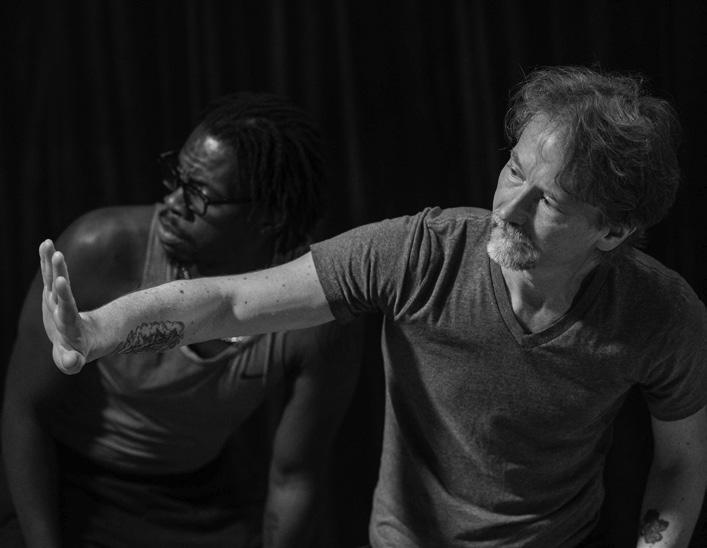
Dr. Jonathan Chitiyo, associate professor of education, co-edited two new books. The first, “Social Justice and Culturally Affirming Education in K-12 Settings,” includes a chapter by his colleague, Dr. William Clark, assistant professor of secondary education, “Hiring Practices for Teachers from Underrepresented Backgrounds.”
The second book Chitiyo co-edited, “Inclusive Pedagogical Practices Amidst a Global Pandemic: Issues and Perspectives Around the Globe,” illuminates some best educational practices related to inclusion during the time of the global pandemic.
4 The Bradford (Pa.) Era Tuesday, August 22, 2023 campus life | august 2023
Dr. Kevin Ewert
1 Futures Way, Bradford, PA 16701 (814) 368-4101
Lanre Morenikeji at Capitol
Campus Celebrates history and future in 60th year
By PAT FRANTZ CERCONE University of Pittsburgh at Bradford
When the University of Pittsburgh at Bradford celebrates its 60th anniversary this academic year, the campus community will reflect on the university’s rich and colorful past, but it also will look forward to an exciting future.
“This year will be an exciting one,” said Rick Esch, Pitt-Bradford’s president. “Not only are we celebrating the 60th anniversary of our founding, but we have new facilities and new programs on campus that will help to enrich the experiences of our students this year and many years into the future.”
It’s no secret that many colleges and universities are struggling, including schools in Pennsylvania and neighboring New York state. High school graduating classes are smaller. More high school graduates are heading straight to work to take advantage of the strong job market instead of attending college. As a result, some institutions have closed, others have merged or cut programs.
Esch is well aware of the complicated and precarious landscape; however, he’s optimistic.
“We’re doing everything we can,” he said, “to strengthen our enrollments, enhance our students’ experiences here, and prepare them for graduation and successful and fulfilling lives, which will ensure the viability of our campus and our region.”
Doing all of that requires a rather long to-do list for faculty and staff. Part of that list includes tactics that are more behindthe-scenes: working with consultants to enhance recruiting and messaging, examining current spaces to determine how best to configure them, and pursuing grant opportunities to fund more projects.
Other new initiatives are more front and center, including enhancing new student orientation so incoming students are well-
engaged and prepared, purchasing new equipment for labs and programs to provide new and enhanced research opportunities for faculty and students, and offering more academic support services to help students succeed.
One significant new project that came to fruition earlier this year was the opening
including the makerspace, was available for any student from any major and began spending time there. They used the laser engraver and 3D printers to create unique and interesting pieces and screened T-shirts and sewed outfits for special occasions.
and dedication of the George B. Duke Engineering and Information Technologies Building. The 40,000 square-foot building houses several majors, including mechanical engineering technology, energy engineering technology, and computer information systems and technology.
Since the building opened in January, students from those majors have been working on projects in all of the building’s unique spaces, from the machine shop to the virtual reality lab.
Additionally, within weeks of its opening, many students discovered the building,
“I’m in the building almost every day,” Esch said, “and I am so happy to see students using all of the spaces, including the study rooms, which are almost always full.”
The building, along with the new engineering technology programs, received broad support from business and industry leaders in the region who look forward to hiring graduates of the programs to fill vacancies and enhance their workforce.
“Having this new facility and these new programs is a win-win for our entire region,” Esch said. “When regional businesses and industries hire our well-prepared graduates it will bolster their workforce, and these
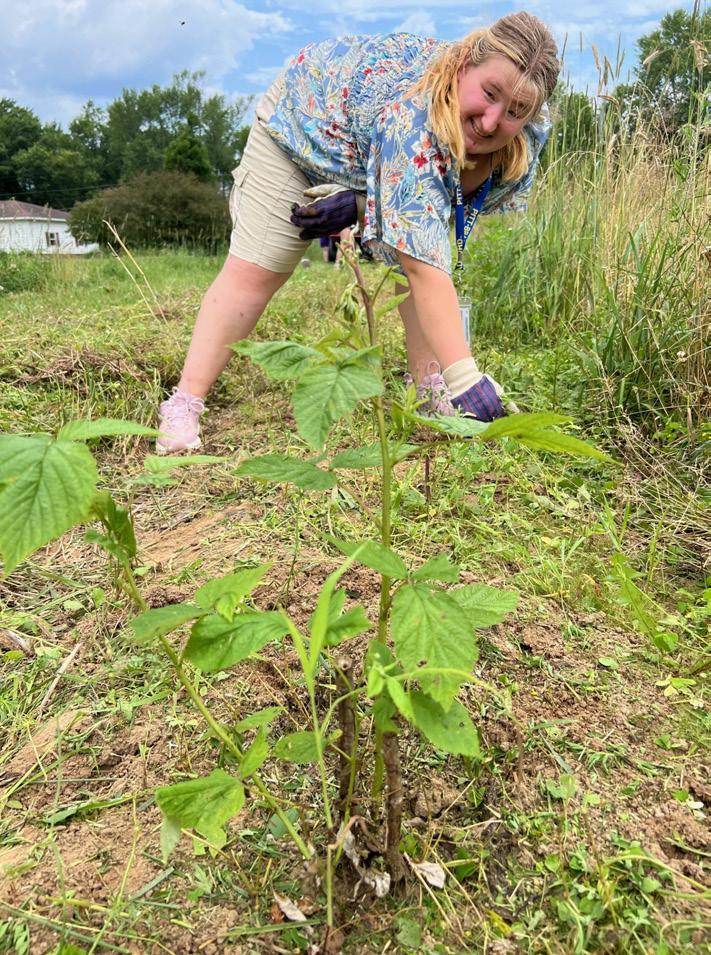
talented young people will begin exciting new careers and stay in our region, which will benefit all of us.”
Down along Campus Drive at the Kessel Athletic Complex, work has begun on a new turf field, which is expected to be completed later this fall.
The new field will give student-athletes the kind of playing field they need and will help coaches and admissions counselors recruit more student-athletes, many of whom in the past enrolled at other schools to play on better facilities.
“Without an artificial field, the weather often made the grass field unusable, which forced practices inside and delayed games,” said Bret Butler, director of athletics. “Our athletes and our coaches deserve better.”
campus life | august 2023 The Bradford (Pa.) Era. Tuesday, August 22, 2023 5
Incoming freshmen at Pitt-Bradford had a new option this year to take part in small, themed First-year Experiences, designed to get them more familiar with the community, the campus and each other. Students in the Foodies First experience spent part of a day helping at Canticle Farm in Allegany, N.Y.
...continued on next page.






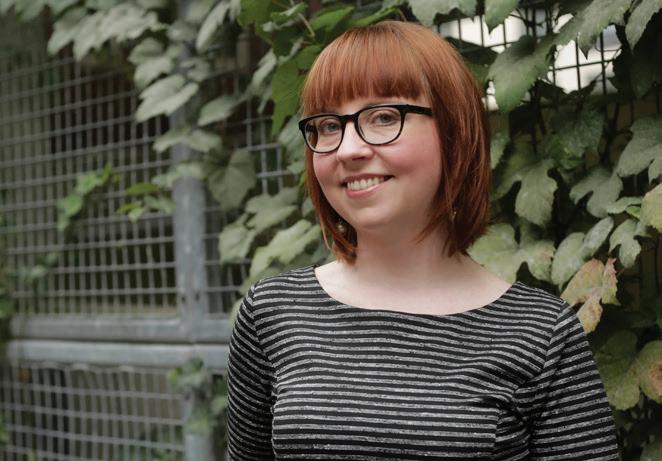




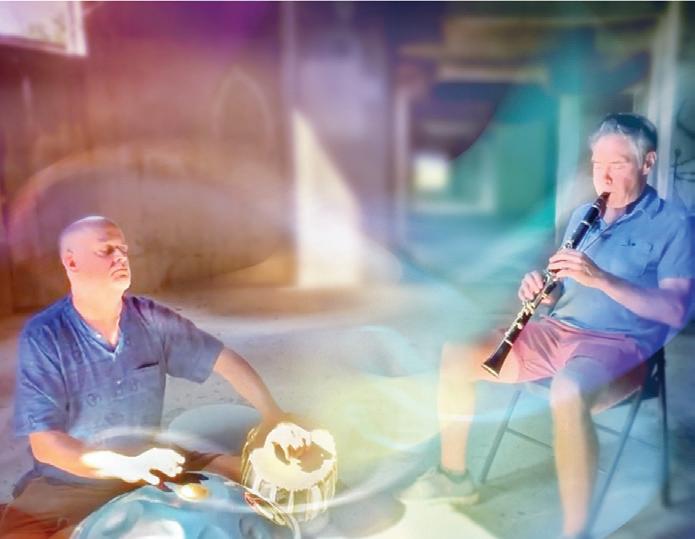









Robin Choo takes over leadership of growing forensic science program
Since the founding of the University of Pittsburgh at Bradford’s forensic science program in 2017, majors have been proliferating faster than the truecrime podcasts that inspire them.









With a new program director and two new mass spectrometers, the program is ready to take its next steps.


Following the retirement of Dr. Francis Mulcahy, associate professor of chemistry, in the spring, Dr. Robin Choo, assistant professor of biology and a trained toxicologist, will lead the program. She is working with current and new faculty to add courses to the multi-disciplinary curriculum and has secured a new gas chromatography mass spectrometer and a high-pressure mass liquid chromatography mass spectrometer that will allow students to analyze evidence. For example, the new equipment can find trace amounts of drugs in biological samples or examine the chemical profile of evidence such as paint chips, blood, fiber samples and more.
The two new gas chromatograph spectrometers are the first equipment purchases in a three-year plan to set up a forensic science lab at Pitt-Bradford and achieve accreditation for the program.
“Crimes are solved with evidence that you can’t see,” Choo said.


The forensic science major at PittBradford includes elements of biology, chemistry and criminal justice. While forensic science itself is a growing field, the major gives students a concrete science background based in method and problem-solving that can be useful across a variety of careers from doctors to lawyers to a variety of investigators, including analysts, intelligence officers, detectives, toxicologist or serologist (a person who scrutinizes bodily fluids).
In addition to analyzing evidence, students learn how to secure and process a crime scene in the campus’s crime scene investigation house.
In the field of forensic science, the number of jobs for forensic science technicians is expected to increase 11% between 2021 and 2031, according to the U.S. Bureau of Labor Statistics, which also cites median pay of $62,000. At Pitt-Bradford, the number of students in the major has nearly quadrupled since 2018.
Choo herself studied biology as an undergraduate student at Mary Baldwin University in Virginia, planning to follow in the medical footsteps of two nurses in her own family.
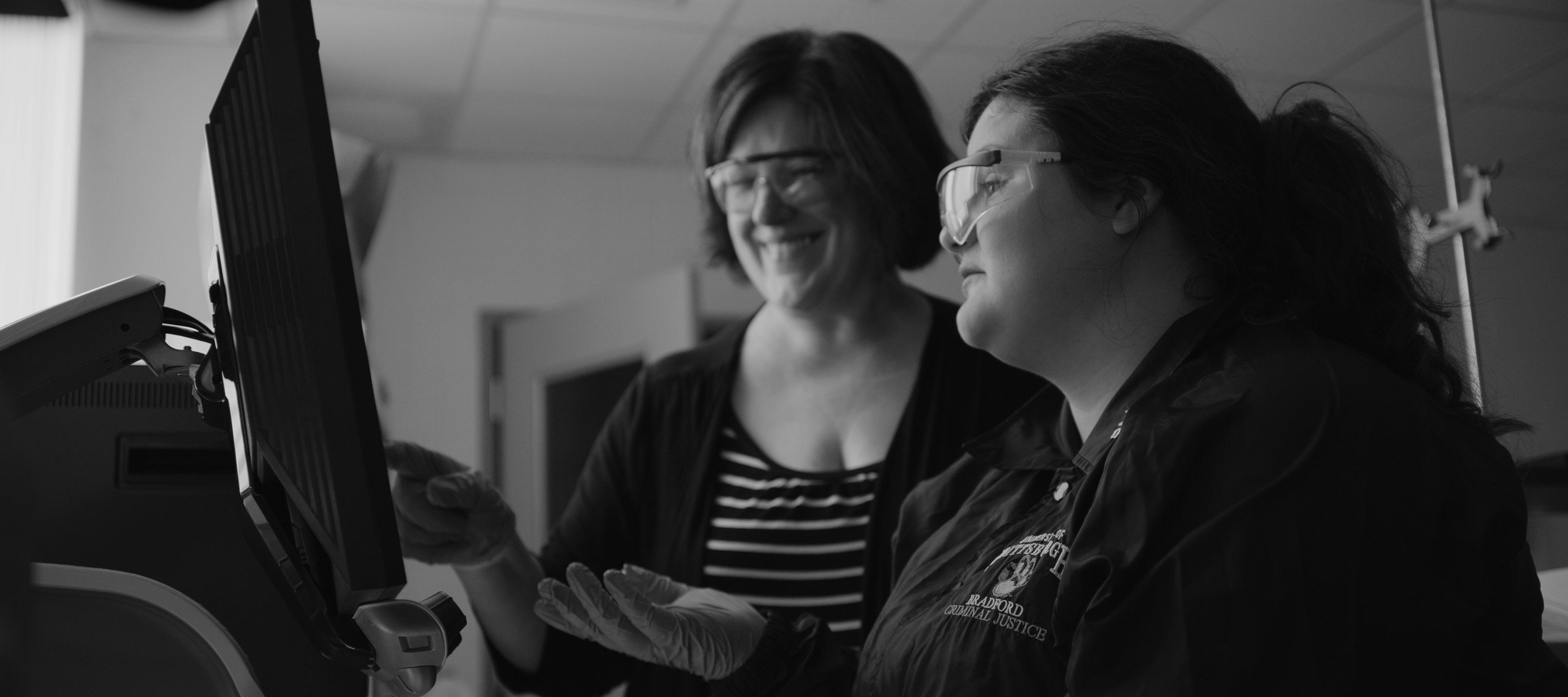
“I was sitting in a medical school interview when the interviewer said, ‘You don’t want to be a doctor, do you?’” she said, realizing at that moment that, no, as much as she liked biology, she didn’t really want to be a doctor.
Choo took several years to explore other avenues for her biology degree: she set up a lab, she worked in a canine endocrinology research lab, and she removed eyes from donors for an eye bank. Gradually, she thought she would like to have her career involve pharmacology, settling on earning a doctorate in toxicology, where she studied the effects and detection of poisons.
As part of her graduate school research, she studied how in utero opiate exposure
affected babies when they were born. When her husband, Dr. Charles Choo, associate professor of physics, began teaching at the University of Pittsburgh at Titusville, Robin Choo did as well, and discovered that she loved teaching as much as researching.
Like solving a forensic mystery, Choo says, “Students are a puzzle, too – figuring out the best way they learn. I want them to enjoy it.”
10 The Bradford (Pa.) Era Tuesday, August 22, 2023 campus life | august 2023
Photo by Peter Chapman Dr. Robin Choo, left, works with a student in the forensic science program at Pitt-Bradford.
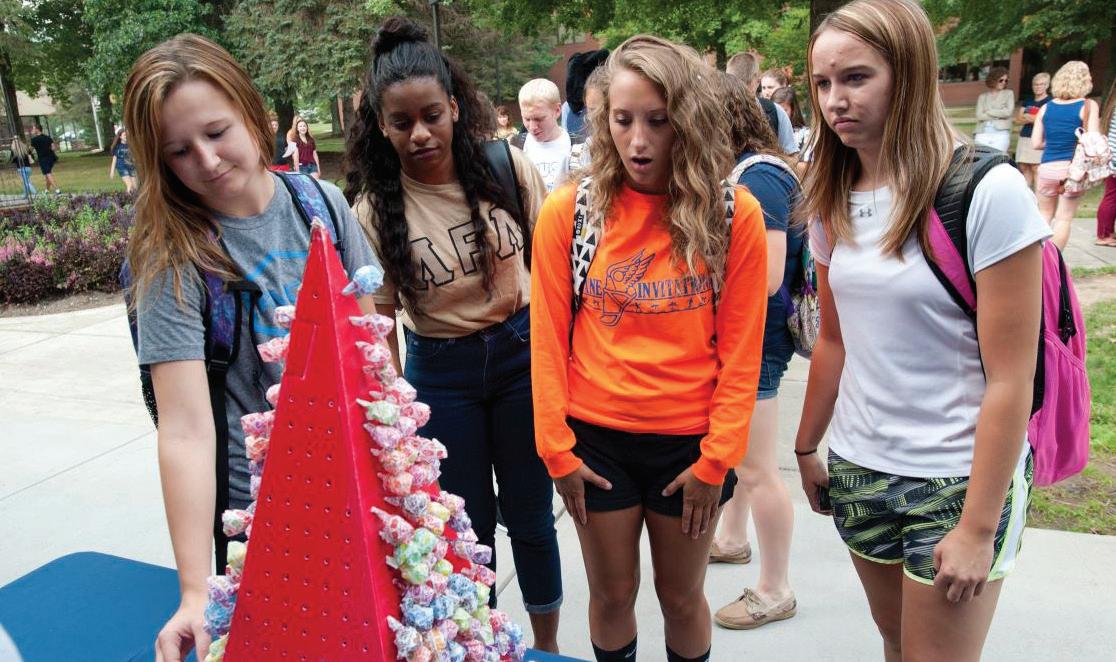






















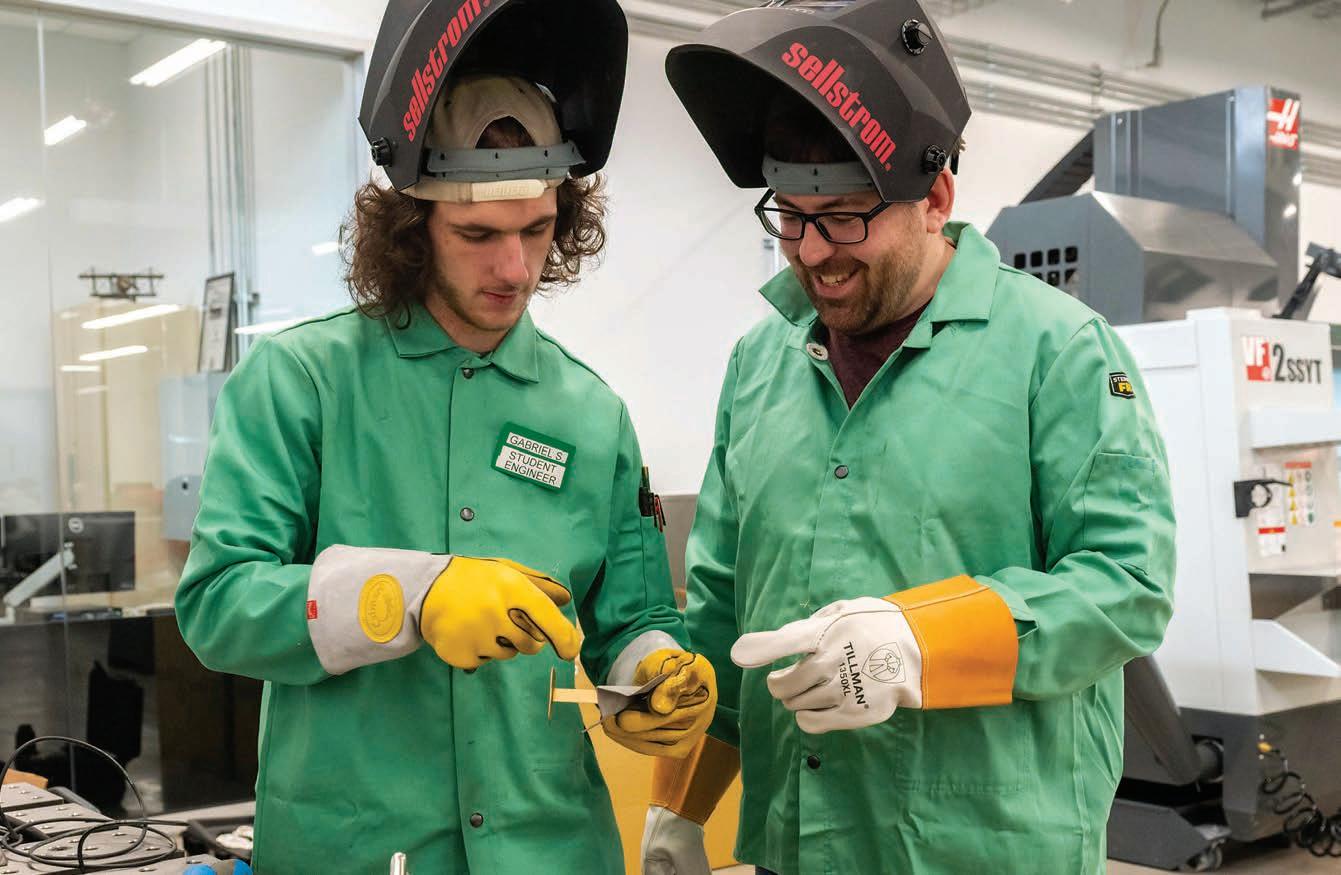
12 The Bradford (Pa.) Era Tuesday, August 22, 2023 campus life | august 2023 Faculty Who Mentor | Endless Adventures | Mind-Blowing Experiences upb.pitt.edu | 800.872.1787 BEYOND EXPECTATIONS LOVE WHERE YOU LEARN.







 (PhoTo by glenn melvin)
(PhoTo by glenn melvin)
































































